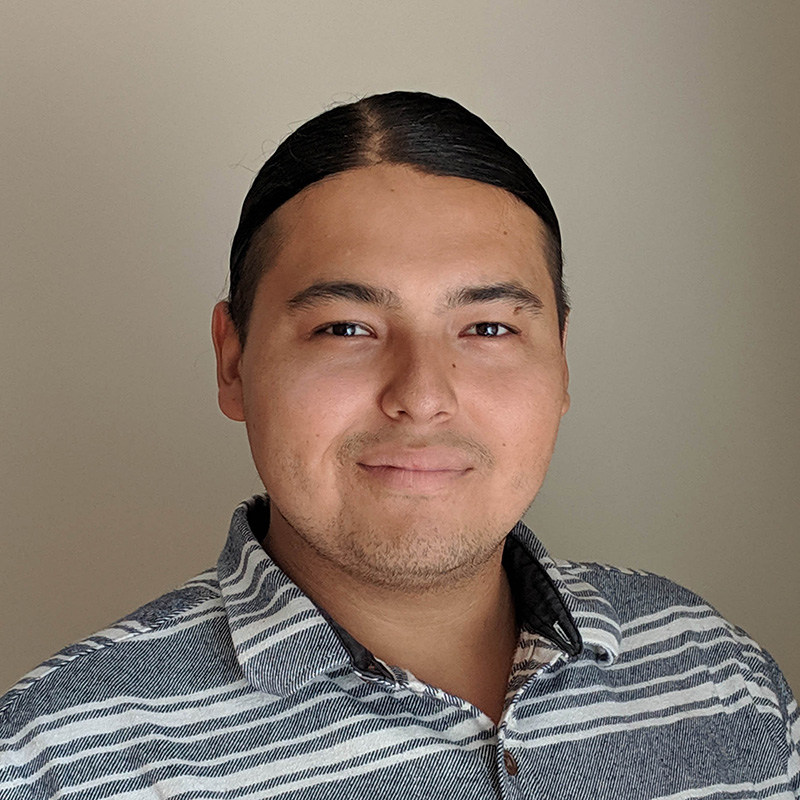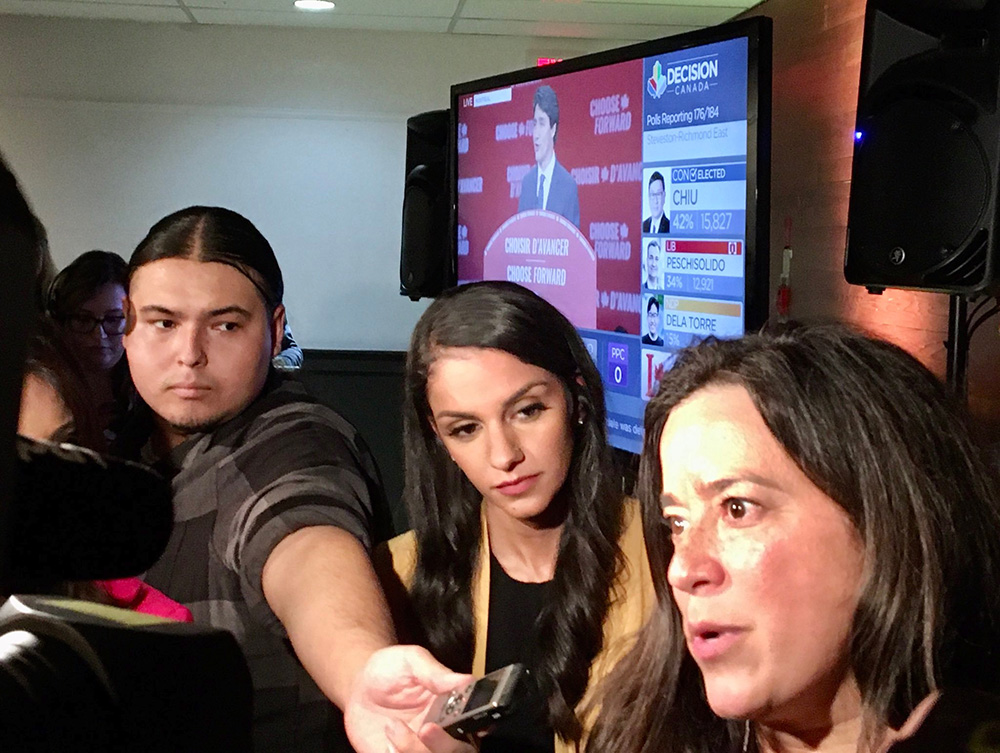Ah! What better time to work at The Tyee than on the eve of an election?
Jamin Mike is the third Emerging Indigenous Reporter we’ve welcomed as part of a scholarship by Journalists for Human Rights.
He’s heading back to Saskatchewan today after two months of prolific reporting. You’ve probably read his stories on the Indigenous youth vote, the Jody Wilson-Raybould campaign and the water crisis on reserves, among many others.
Jamin, who’s 22, comes to us from many different worlds.
He grew up in the Beardy’s & Okemasis' Cree Nation, where he had his first journalism gig at the community radio station.
“The radio station on the reserve helped kids stay out of trouble, and gave us something to do,” said Jamin. “We entertained our community, and the elders and kids loved it. I only wish every community had this opportunity for their youth.”
It led Jamin to pursue the journalism-intensive Indigenous communication arts diploma at the First Nations University of Canada, and he is currently finishing his English literature and history bachelor of arts at the University of Regina.
Before arriving at The Tyee, he’d reported for Saskatchewan’s Indigenous-owned Eagle Feather News and the Missinipi Broadcasting Corp.
Jamin also hails from the world of scholarly-book publishing, having worked as a sales and marketing assistant for two years at the University of Regina Press.
All these experiences inform his storytelling. Read any story by Jamin and you’ll see how he connects personal stories with the bigger picture.
Before we let Jamin catch his flight, we wanted one more chance to learn from him. Here’s what he had to say.

The Tyee: We know that you’re a big reader, reading a few books a month. But how did you decide that you wanted to be a storyteller yourself?
Jamin Mike: I actually had really poor education in literacy growing up. Before high school, I didn’t stay at a school for more than a year.
The first book I read was The Book of Negroes by Lawrence Hill. Then I discovered the world of Richard Wagamese, where I felt a fire ignite in me through his stories.
When I was in Grade 11, I won a youth writing contest for Eagle Feather News in Saskatchewan. I wrote a personal reflection on growing up Indigenous, and how it related to politics and society in Canada. It was kind of all over the place, but it inspired me to pursue journalism.
You worked in publishing for two years. How did that inform your journalism?
It was really intimidating working in a white-dominated industry as a young First Nations man who was unprepared for the world of people making books, making knowledge. I was one of probably no more than 10 Indigenous people working in non-fiction publishing in Canada.
But I got to learn the ins and outs of scholarly publishing and the non-fiction trade. I ended up being really good at it, making friends, networking with scholars, and that opened a lot of doors for me. It made me even more obsessed about the art of writing and writers, and I know literary journalism is where my heart is.
What are your highlights from your time with us at The Tyee?
I’ve never learned more to prepare me for journalism! I got to get out of my comfort zone and work for a publication in a different province. I liked the independence, and the help I got from editors on the craft of writing, doing interviews and putting pressure on government communications.
I also got to see a lot of interesting people. I heard Jody Wilson-Raybould speak three times! I saw her at three different events, including election night. I also got to see Greta Thunberg, and meet writer Monique Gray Smith and lawyer and writer Harold Johnson.
What’s it like being an Indigenous journalist in Canada today?
It’s really intimidating being a young Indigenous person, especially when writing about politics.
What if a young Indigenous journalist gets a fact wrong?
Sometimes it seems like even existing is controversial, considering that the relationship between Indigenous peoples and Canadians is always so uncertain.
I find mentorship programs like this one really refreshing, where you give Indigenous students a space to learn and grow.
It might seem like a conflict of interest to some that an Indigenous reporter is the one reporting on these issues, but I was told by my instructors that it’s not: we have a certain duty and obligation to do so. It’s not a conflict of interest to want to uplift societies.
Is there a Tyee story that was challenging to write because of controversy?
On my story on the Indigenous youth vote, I had anxiety about facing backlash because the Indigenous community is so small, especially in media.
There’s the Indigenous people who think voting is the way to go because you have an opportunity to have some kind of voice. Then there’s people who think that by voting you are participating in a colonial system that’s against you.
I can see the principles of both; they’re very familiar to me. As the journalist, I tried hard to present a balance, and I tried to present the arguments clearly and wholly — I didn’t want either to be misunderstood on social media.
Any tips for non-Indigenous journalists writing on Indigenous issues?
Look for the people in the corners because they have valuable stories. You can easily find spokespeople who have overshared, who’ve already had the chance to speak.
Any tips for non-Indigenous Canadians on learning more about Indigenous issues?
An Indigenous studies course at a college or university is always a good starting point.
Also, reading Indigenous news and supporting Indigenous news. It’s very important that Indigenous people get support to tell their own stories when their lands are being occupied.
And if you’re talking to an Indigenous person and you feel like they’re not coming from a place of fact or of science, you need to understand that they’re coming from a place of stories. A lot of people don’t understand that something like oral histories is, from our perspective, our scientific means.
I saw that fatigue at the climate rally when Indigenous leaders were speaking, you could feel that energy, with mostly white people rolling their eyes as if they’re wondering why Indigenous people are delaying Greta Thunberg’s speech.
So listen to Indigenous people, even if you don’t really understand what they’re talking about. And if you don’t agree with that Indigenous person, find another Indigenous person! Just keep listening to their stories. It’s that simple.
Honestly, there’s no excuse nowadays with our technology. You can find an academic article or someone’s Facebook post. Listening is the best tool for learning.
It’s been a slice, Jamin! Any parting reflections?
As someone who’s faced a lot of disappointment and barriers, I could’ve just given up. It’s important that if young people are interested in telling stories, especially if they’re Indigenous, they have an opportunity to sit in a newsroom and learn how to tell stories. Nobody can make you feel like you have no right to tell stories because they barely have that right themselves. ![]()
Read more: Indigenous, Politics, Media

















Tyee Commenting Guidelines
Comments that violate guidelines risk being deleted, and violations may result in a temporary or permanent user ban. Maintain the spirit of good conversation to stay in the discussion.
*Please note The Tyee is not a forum for spreading misinformation about COVID-19, denying its existence or minimizing its risk to public health.
Do:
Do not: